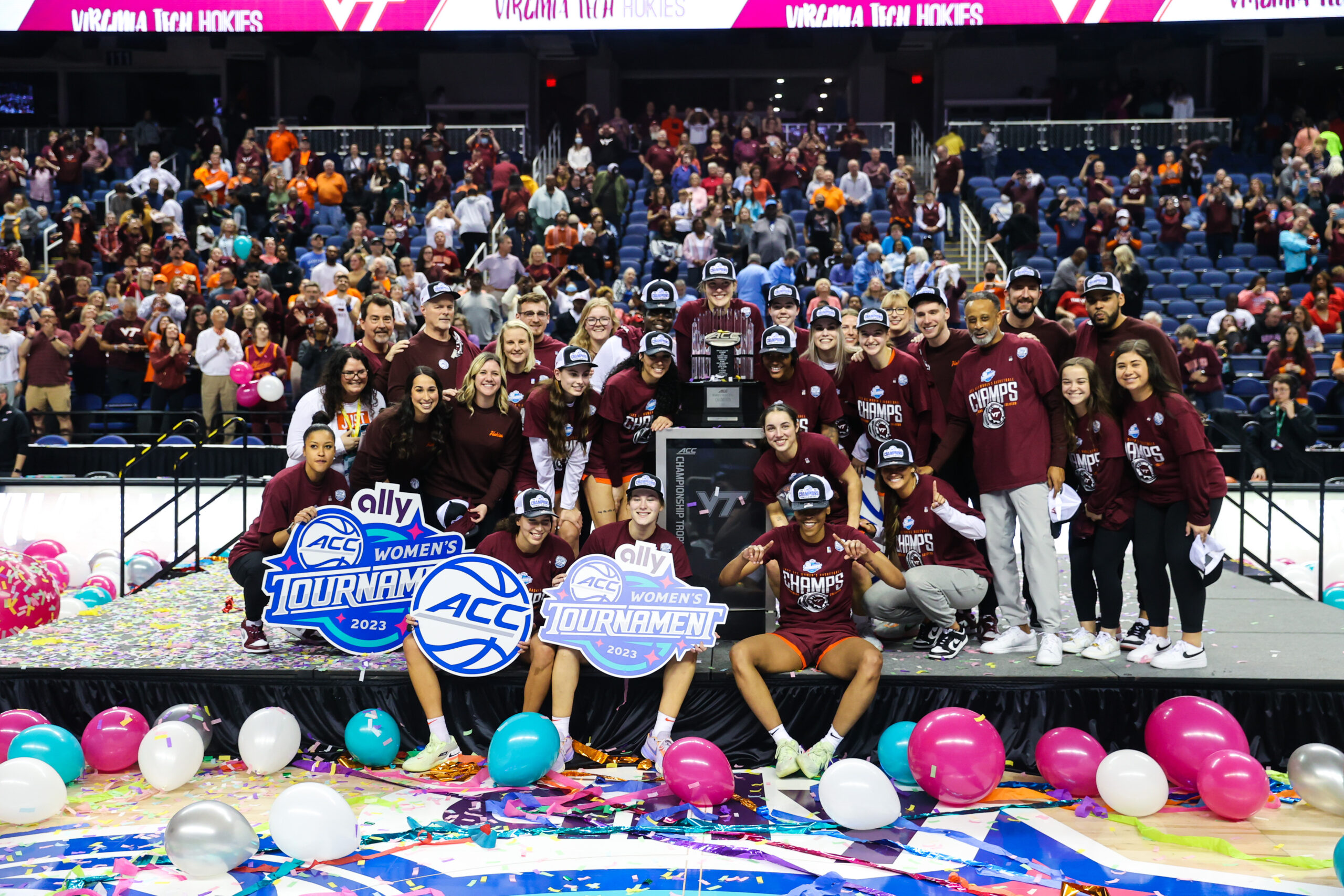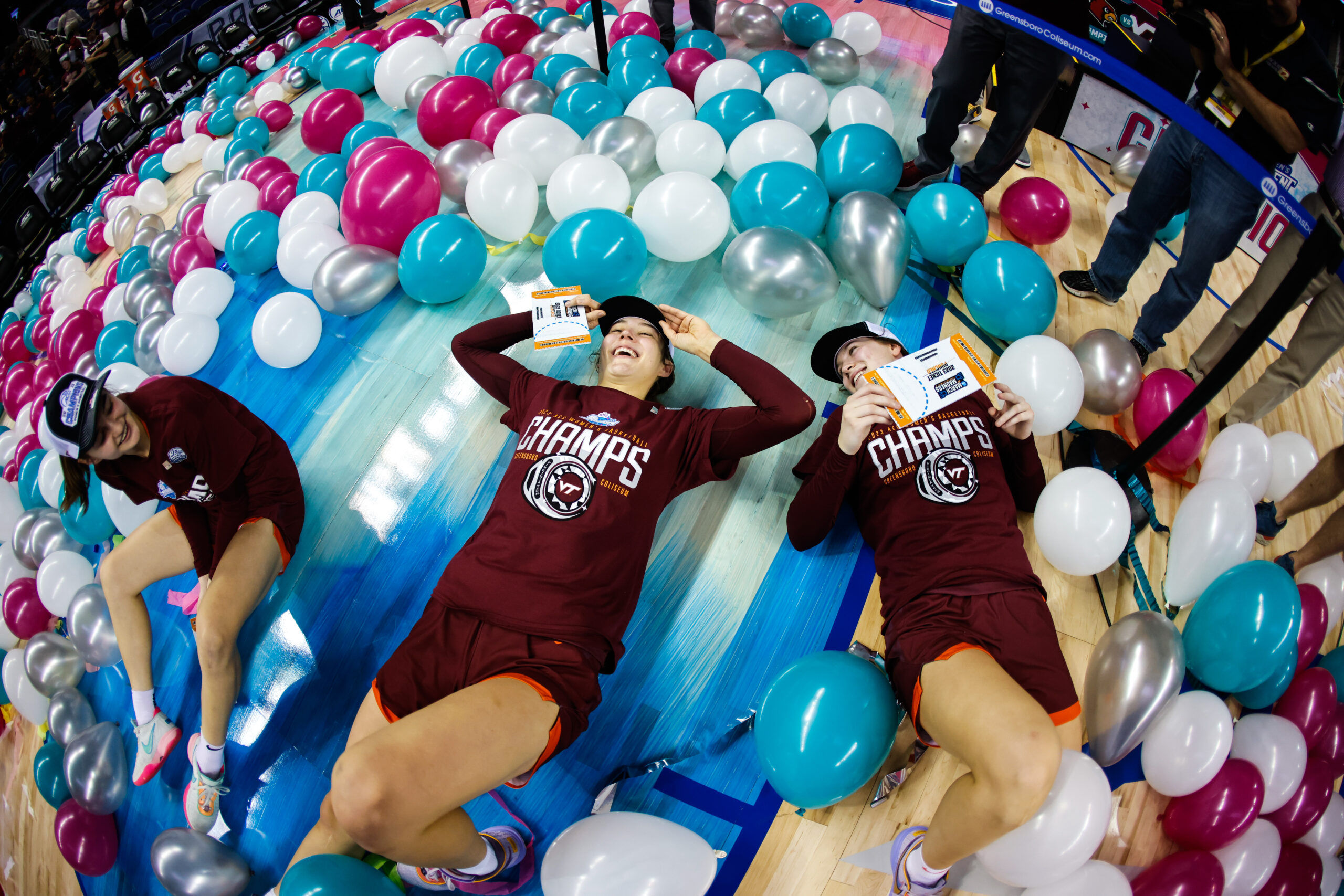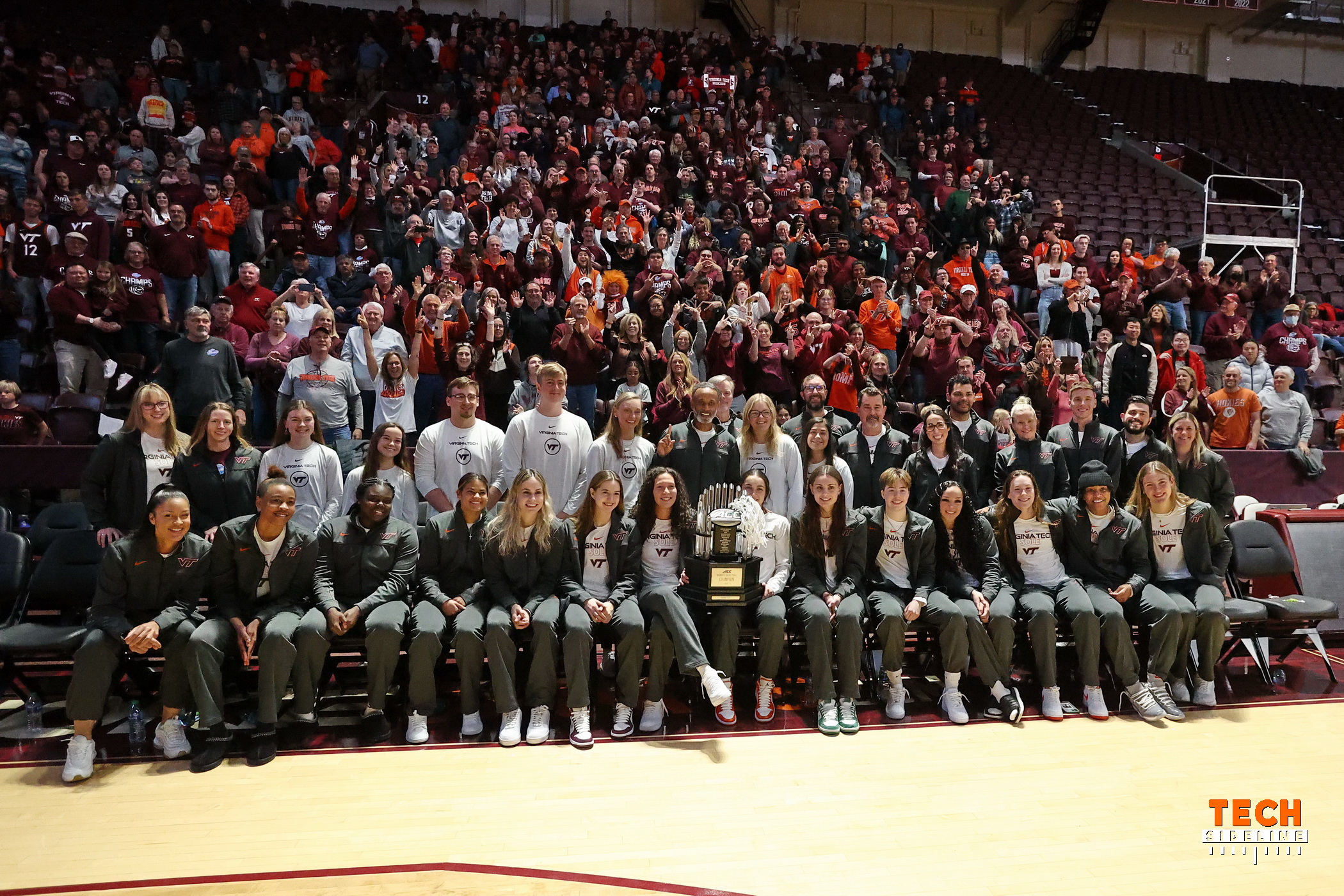
Outside of Kenny Brooks, there have been three constants in the Virginia Tech program in the seven years of his tenure: Greg Werner, Tim Clark and Erin Cash.
Brooks is in his 21st season as a women’s basketball head coach at the collegiate level. And for all 21 years, he’s had a combination of Werner, Clark and Cash to lean on. Though their contributions aren’t necessarily obvious to the typical fan that watches the Hokies play basketball, they’re the ones who helped turn Virginia Tech into the powerhouse it’s been in 2022-23.
Werner, Tech’s strength and conditioning coach, goes the farthest back with Brooks. He started at James Madison in 1992 as an assistant in the strength and conditioning program. He worked with all sports, including the men’s basketball team, which was then led by Hall of Fame head coach Lefty Driesell. Werner also missed Brooks, who played at JMU from 1988-1991, by a year.
After receiving a promotion in 1995, Werner oversaw strength and conditioning for every JMU sport. He helped build up that side of the Dukes’ athletic department, taught classes as an adjunct professor in the School of Kinesiology and became a staple of Brooks’s women’s basketball program at the same time.
Clark, the Hokies’ current chief of staff, has worked with Brooks for half of his life. A JMU alumnus, he tried to walk onto the men’s basketball team in 2005. He didn’t make it, and the Dukes didn’t need any managers. As a result, he walked across the hall to the women’s basketball offices.
It was there he met Brooks for the first time as an 18-year-old. A Richmond native, Clark always knew he wanted to be involved in sports, and he spent his four years in college helping Brooks and Werner elevate the JMU program. He became a graduate assistant in 2009 and was promoted to Director of Operations a year later.
Meanwhile, Cash, Tech’s Senior Director of Sports Medicine, joined Brooks 12 years ago. A Virginia Tech alumnus, she was a graduate assistant with the Hokies from 2006-09. After graduation, she worked at Florida State for two years before applying for a job at James Madison, where she developed an instant connection with Brooks.
JMU was looking for a new athletic trainer, and three were brought in for interviews. Brooks nodded his head along with the first two candidates, but it didn’t take long for him to see that he and Cash were on the same page, and they’ve been a team ever since.

Outside of 2015-16 when Werner spent a year at Auburn, the quartet — Brooks, Werner, Clark and Cash — has been fully intact since 2011. The group’s record since 2011-12: a remarkable 290-107 (.730). In conference play? An impressive 140-66 (.680).
Barring 2020-21 when the number of games was limited due to COVID, Brooks, Werner, Clark and Cash have won 20-plus contests in every season they’ve worked together. They’ve made the postseason every year, too — six NCAA tournament appearances and five NIT bids. And they’ve finished first or second in their respective conference six times.
“We’re a team,” Brooks said on Monday. “And that’s very, very important to be because we have to be on the same page with all of our kids and everything going on.”
Indeed. Which is why when Brooks was offered the Virginia Tech job by Whit Babcock back in 2016, he had two conditions: he wanted to be able to hire his own strength coach (Werner) and trainer (Cash). He obviously brought Clark in the fold, too. But as odd as those demands may have seemed then, they’ve paid off over the last seven years.
As soon as Werner toured the Hokies’ facilities with Brooks, he asked for a pen to sign on. Clark and Cash had similar thoughts when they were offered positions. In their mind, they did more with less at James Madison.
“I said, ‘Where’s the contract? We can do great things,’” Werner told Tech Sideline in an interview. “At JMU, we were doing great things, sending kids to the WNBA, winning championships. [But] we didn’t have a practice facility. We had a weight room that I had transitioned from a closet into a weight room. We didn’t have the things that they had [at Virginia Tech].
“I said, ‘We can win championships here.’”
But it wasn’t instant, nor was it easy. The group had to change the culture, which started with the 2016-17 team, led by seniors Vanessa Panousis, Sami Hill and Sidney Cook. At that point, Virginia Tech was accustomed to losing. It had been 10 years since the last NCAA tournament appearance and 20-win season.

Though the Hokies got off to a hot start — 15-0 and No. 18 after Jan. 18 — they hit a wall, finishing 20-14. Despite improvement in year two, there were similar rough patches. They were 23-14 and won six of their final eight games, which involved a trip to the WNIT final in Bloomington, Ind. But a 22-12 showing in 2018-19 after a 13-0 start gave off similar vibes to the first two seasons.
However, even when it seemed as if the Hokies couldn’t get over the hump, the core of the program — Brooks, Werner, Clark and Cash — continued to make progress behind the scenes. In came a talented recruiting class that featured Elizabeth Kitley, Cayla King and Taylor Geiman. On top of that, Georgia Amoore enrolled early in the winter to get a head start.
“Were there times where it was really hard to see? Yeah,” Clark said. “There were times where it was like, ‘Man…’ [But] we never cut corners. We never tried to take the easy way out. And we lost at first, and we let that fuel us a little bit. ‘This doesn’t feel good so we need to do something else. We don’t want to experience this again.’ And that’s just hard work.”
In 2019-20, Brooks & Co. finally turned the corner. A combination of veterans — graduate students Taja Cole and Lydia Rivers with junior Aisha Sheppard — and rookies — Kitley and King — helped the Hokies to a 21-9 record. Their 11-7 mark in conference play tied for fourth in the ACC. Still, their season came to a disappointing end when COVID-19 hit and put sports on hold.
But Virginia Tech was able to build off a solid foundation from that point on. The breakthrough 2020-21 was rewarding, even with limited games due to the pandemic. Tech played in the NCAA tournament for the first time since 2006 and beat Marquette before running into No. 2 seed Baylor, a buzzsaw. And the core evolved.
“We say a smart team that is well-connected will beat a more athletic team that is disconnected,” Werner said. “And they [Kitley, King, Geiman and Amoore] are so smart. They’re tremendous students, smart kinds, they want to work tirelessly. … I knew with them as freshmen, we’re going to be good if we keep adding pieces around that.”
That bled over to 2021-22, in which VT was 23-10 (13-5 ACC), finished fifth in the league and earned a No. 5 seed in the Big Dance. Kayana Traylor was a big addition to the already existing talent. Yet, the program had its objectives set higher than that. It fell short of hosting a subregional in the NCAA tournament.
Not in 2023. That’s when the Hokies met their goals. And in some cases, exceeded them. 27-4, 14-4 in the ACC, tied for second in the conference, a No. 1 seed in the Big Dance, hosting a subregional in Cassell Coliseum.

When Werner, Clark and Cash arrived, they believed they could reach that championship level. They’d done it before at JMU with less resources, but they knew it wouldn’t be a flip of a switch. That’s why the ACC Championship in Greensboro was so special. It was a title seven years in the making.
“Coach Brooks talks all the time that blood, sweat and tears will be worth it,” Cash said. “That’s why it’s so emotional at that moment cutting down the net, and it was true of this year, but for us more specifically, it was true of the last seven years.
“We knew we’d be here. And I think that’s what makes us good at our jobs, and that’s because we believe in each other, we have the support of each other. We knew that it would pay off.”
There was a learning curve with the transition from the CAA to the ACC. Everybody involved with the program experienced it. Clark said it was actually harder than many anticipated. But it’s part of the reason why Brooks, when asked what it felt like to lift up the ACC Championship trophy, said it was “heavy.” It carried the weight of their hard work.
Werner, Clark and Cash have a great relationship. They’ve helped create a family culture at Virginia Tech. Players feel like they can go to any of the three for anything. Amoore joked that if she was stranded on the side of the road two hours away, she knows Clark would drive to come help her out; those are just the type of people involved in the program.
As Clark put it, good humans attract other good humans. Hard workers attract hard workers. And Werner, Cash and Clark have done that every day in their seven years in Blacksburg, even if they flew under the radar of most people outside of the program. They’re a large reason why the Hokies are competing for championships.
“I think the consistency of having them around really accelerated the whole situation,” Brooks said. “We’re a big family that’s connected, and I think it’s really paid dividends to accelerate this process. It takes time to build a program. You don’t just get players in here and all of a sudden you win, it’s a whole operational staff.
“I think I have one of the best staffs in the country; they do a tremendous job.”





 Print
Print







Great article. Coach Brooks and the entire program make this old Hokie very proud.
Great job, David. Awesome story!!!
This is a REALLY FINE insightful read! Thank you, David!
David, two great articles in a row. You’re setting a pretty high standard for yourself. Besides what you already learned in school, you’ve acquired many of the skills of Chris and Will (with a little more Will than Chris). Keep up the good work.
Not to diminish these three’s accomplishments, the biggest factor in the teams play in the last half of the season was the offensive adjustment regarding Kitley. For 3 years we’ve tried desperately to get the ball down low to Kitley. But teams we played adjusted and focused their defense on denying her the ball. As a result large number of our turnovers came from trying to force it inside. And even when we got it to Kitley, many times she was mauled by double and triple teams and a turnover occurred. About mid season CKB adjusted and started moving Kitley more and getting the ball to her 10-12 ft from the basket where she had a single defender and time. Her fall away shot made this move unstoppable, spread the floor, lowered our turnovers and made the entire offense more efficient. Kudos!!!
No reason to spill the beans on the special sauce! 😉
GO HOKIES!
It would be good to know what things they specifically did to get over the hump besides VT getting certain players to come . I know what trainers and strength people do. When the previous teams faded, why? Besides not being good enough in ACC play. Did they change workout approaches? Did they change diets? Did the players on previous teams not buy into the workout regimens? Did they add technology to help with recovery. I toured the WVU training facility many years ago, and it had added chambers and more recovery pools and easy nice. I love the article and exposure these people get. I just find articles that basically say “we worked hard together a mmm d got over the hump” to be just general when a cool piece would dive into what actual steps and changes occurred. Beyond bringing in a certain set of players like kitley, soule, and amoore